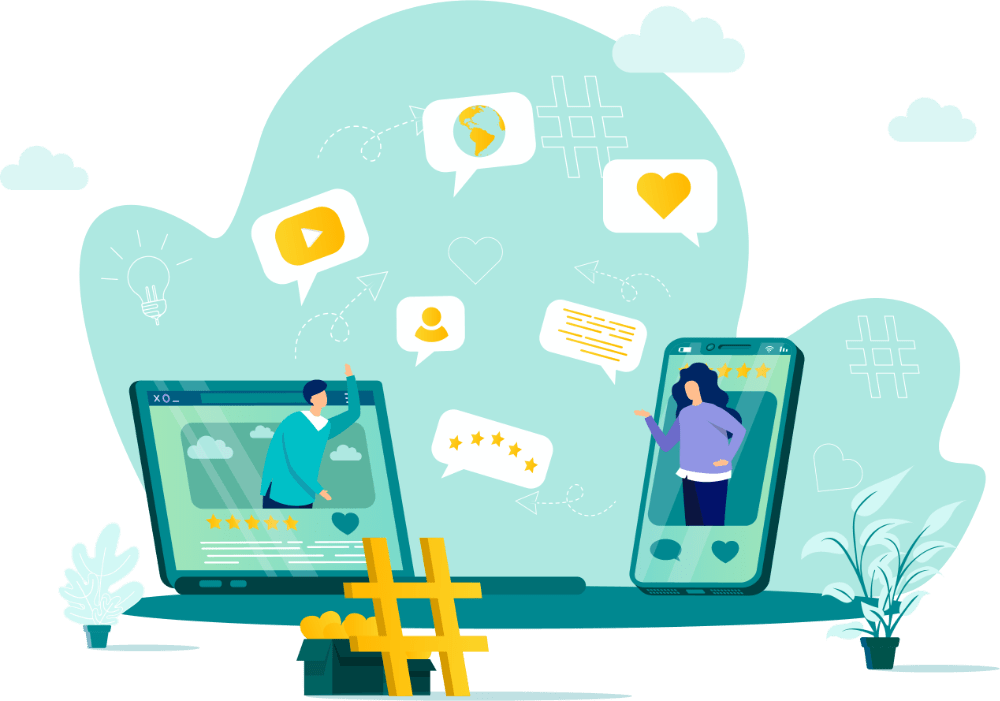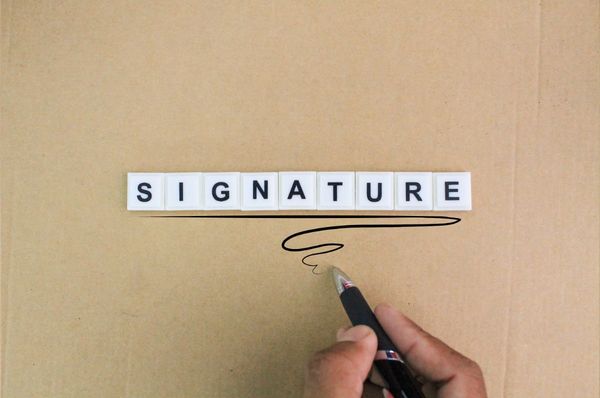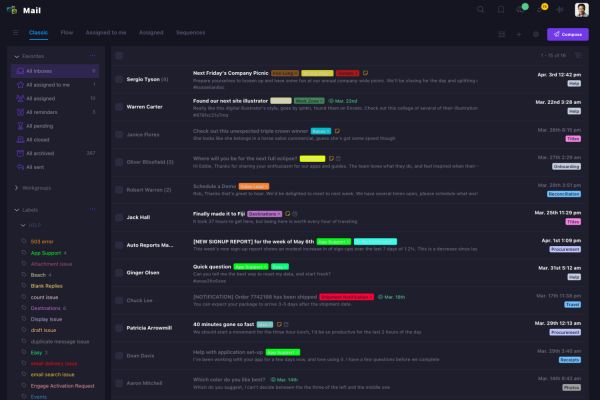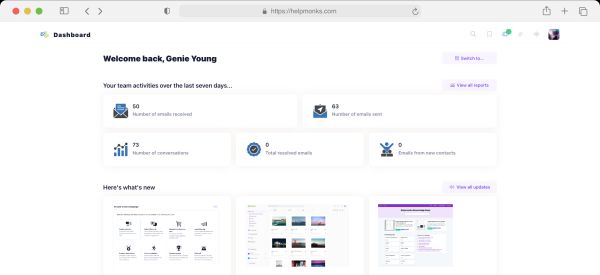
Introducing new pricing for Helpmonks
Discover Helpmonks' new pricing structure, featuring a flexible PRO plan, a FREE plan for smaller teams, and an exciting affiliate program. Experience unparalleled email management solutions today!
Read nowBusinesses are finding it increasingly difficult to encourage team collaboration. Their challenges include:
Many companies were unprepared and overwhelmed by remote team collaboration at the start of the worldwide Covid pandemic. However, as more companies expand to multiple locations or go fully remote, the scope of these challenges will only continue to grow.
When collaboration and team skills are absent, businesses can become a collection of competing silos and individuals.
Team collaboration tools help keep departments and decision-makers on the same page at all times. They are even more crucial as companies become increasingly distributed. We all have seen the benefits of team collaboration tools in the last 18 months during the worldwide Covid pandemic.
Team collaboration is the main ingredient your organization needs for every other element – talent, innovation, productivity, and profitability – to fall into place.
According to a recent Workplace Productivity and Communications Report, over two-thirds of employees' time was spent communicating with others. So much time devoted to communications demonstrates it is an essential need for effective collaboration.
Team collaboration is nothing new. However, there's more to it than just making sure everyone gets along. It's about finding new ways of working as a team, creating an innovative culture, achieving goals and objectives, and acquiring better solutions.
With the world more connected than ever, knowing how to develop lasting working relationships has never been more critical. It's also necessary for business growth and development, as well as keeping ahead of your competitors.
To create collaboration, team members need to have a convincing reason to be a part of the company mission. The more compelling the task, the easier it is to inspire team members to collaborate. When they're given a clear and gripping cause to be involved in, team members naturally become as passionate about goals as their leaders are. Huge benefits result when collaboration permeates an entire organization, from engaged employees to increased retention, stronger attraction of talent, faster time to market, and improved profitability.
To strengthen a company, create a values-based culture—a culture driven by collaboration and professionalism. When you treat employees as people instead of cogs in a wheel, you remove the stress that can lead to toxic workplace conditions. When employees are happy, and collaboration improves, so does an organization's ability to handle sudden disruptions. Teamwork makes it easier to pivot when customer preferences change or new technologies enter the scene.

Successful team collaboration looks different depending on your team's goals and objectives.
Here's what we think you're team's going to need for effective collaboration in the workplace.
Effective communication is what separates successful teams from the ones who fail. Having clear instructions from the get-go and throughout the project delivery is a must. Asking ethical questions instead of making assumptions and actively listening to your team members will create a culture of camaraderie and provide transparency for your responsibilities and expectations. Besides, it can reduce stress levels and tensions that sometimes arise when working closely with others.
Creating an open communication channel where feedback goes both ways enhances the skills of your team and solidifies trust. No one knows the efforts you go through better than the people who work closely with you every day. Team members exchanging advice and constructive criticisms will only improve performance and build stronger relationships.
Collaboration depends on communication. It isn't the kind of communication that is just top-down or occurs in a weekly meeting. If you want to stoke team collaboration, you need to open up how your teams communicate. By promoting openness and ownership, every member should be able to communicate with equality and authority.
Improving cooperation and communication is critical—leverage technology to strengthen internal and external communication via instant messaging and video conference calls.
You don't want an employee on your team who is detached from the work, peers, and the project's goal. To prevent this from happening, ensure that every member knows their purpose and that each contribution is adequately valued. Remember that an engaged team is also happy and focused one too.
Leverage each team member's strengths. To empower each team member, focus on their strengths rather than working around their weaknesses. Ask each member to take a personality test and share the results. That is a great team-building exercise because the results allow each person to know their colleagues much deeper.
A successful team requires expert leaders. Being tasked with guiding a team towards their target is not easy and requires technical, personal, and organizational skills. Your job as a project manager is to ensure harmony among the team to meet their objectives within the set timeframe and criteria. Besides, a good project manager accounts for the different individuals in the team and fosters a collaborative working environment.
People tend to resent collaboration when they aren't given clear objectives and key performance indicators or don't understand what their teammates bring to the table.
Having people with different ambitions on your team will mean that everyone will not always see eye to eye. To compromise, a core element of team collaboration will get everyone to agree on a solution and keep the work flowing smoothly. Respecting your fellow team members demonstrates a willingness to be cooperative and set differences aside for the team's sake, time, and success.
Sometimes when you group many people to work on a project, there can be unfortunate instances where they may not get along. Ultimately it's the project manager's job to resolve any conflict within the team. It is also an excellent skill for team members to manage and resolve the issues themselves.
Turf wars discourage collaboration. One of the collaboration's main benefits is that people, even those with vastly different skill sets, can mentor and teach each other. Competitive barriers prevent knowledge sharing.
Dependability builds trust, and without it, you don't have a team. You have a bunch of people working together begrudgingly. Being part of a team means relying on others to hold up their end of the bargain. The success of a team depends on every members' efforts and contribution. That is especially the case for teams that have members working remotely.
A team without accountability will be collaborative in a way that isn't as helpful to team performance as it could be. Ensure that the goals are set, those team roles are defined and encourage the team to collaborate.
Developing a collaborative group starts with the team itself. That includes buy-in concerning process, direction, and expected outcomes. If teams aren't engaged, they won't be able to identify problems or collaboratively find solutions.

An absolute must-have of team collaboration is, of course, team players. Putting the group's best interest ahead of yours should be your priority. Remember, the effect of a combined effort is more remarkable than individual performance. For the team to reach their goal successfully, everyone has to work together.
Diversity applies to different skill sets, the expertise of the roles, and the personalities of the individuals in the positions. The beauty of working in a multi-cultural team is that it exposes people to different perspectives and experiences.
If your team is filled with diverse perspectives, inform your whole team about this. Unique ways of thinking come with different behavioral preferences. That's a lot to manage, but it's a good thing. Make it know that individual perspective are unique and valued.
The reasons for using team collaboration software are pretty straightforward. Online collaboration tools are a vital element of effective collaboration. These tools offer your team a centralized solution where all the project's work can be announced, shared, updated, and executed.
Meetings don't cut it anymore and are mostly there to stroke someone's ego. The world is too fast, the speed of business is too great, and the demands of your workforce are too high to think that collaboration happens in a face-to-face meeting. Use your resources like Slack, Microsoft Team, Mattermost, or an internal Knowledge Base, or others to put the idea of collaboration into the moment.
Your best people are creative problem solvers. Great leaders, help them cut loose and listen to them without prejudice. Make creativity a vital point of your company culture. Encourage employees to cultivate ideas, especially in a collaborative environment. Set up regular brainstorming sessions and get everyone involved.
Getting input from people doesn't mean coming to a consensus. Team collaboration is about pursuing new ways of working, new ideas, and different perspectives to reach clear goals and gain better solutions.
For teams to grow, they need to feel creative, brainstorm, and question the status quo in an open and non-judgmental environment. It's also important to ask team members for their ideas and reasoning regularly. The more connected and understood they feel, the more motivated they'll be to perform, think outside the box, and exceed expectations.
There's something to learn from every project – even failed ones. Learn from mistakes, and use those lessons to build stronger teams the next time around. Reward all people on your team as everyone will respond to positive reinforcement.
If employees are not recognized for their team effort, it can undermine all of the other strategies. It's common to find incentives that are based solely on the goals of one department.
For cross-functional collaboration to improve, it is vital to set goals that will enhance the overall system, not just one part of it.
Scheduling meetings with a large dispersed team, sometimes even an international team, can take longer, especially with the different time zones involved. Meetings also take away precious time your team has to work on to meet their timeline.
Therefore, limiting meetings and ensuring a strict schedule and a well-defined method to document follow-up tasks is essential.
Growing companies must understand the value of team collaboration – it's not just a buzzword – to find ways of encouraging it within their teams.
The team at Helpmonks spent many years looking for the perfect team collaboration tool. As they did not find one, they built it themselves. Nowadays, Helpmonks features a shared inbox, live chat, tools for email marketing and tools for marketing automation. Soon, the team will add a publishing platform for digital content creation. All this, for an unbeatable fair price, especially for small businesses. Check them out today.

Discover Helpmonks' new pricing structure, featuring a flexible PRO plan, a FREE plan for smaller teams, and an exciting affiliate program. Experience unparalleled email management solutions today!
Read now
Dynamic email signatures increase brand visibility, build brand identity, and boost conversions. Learn how to create and update dynamic email signatures.
Read now
Looking for an email marketing automation software? This guide shows what to look for. We'll also review the best tools for your online marketing needs.
Read now
Using customer engagement solutions helps you keep your existing customer base and grow. Here are the top 10 customer engagement solutions for your business.
Read now
Empower your team and delight your customers.
